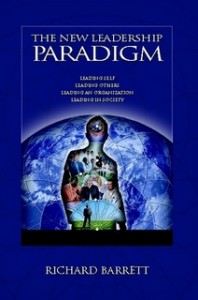 Richard Barrett. The New Leadership Paradigm: Leading Self, Leading Others, Leading an Organization, Leading in Society. The Values Center, 2010.
Richard Barrett. The New Leadership Paradigm: Leading Self, Leading Others, Leading an Organization, Leading in Society. The Values Center, 2010.
If you are truly interested in adult development and/or integral leadership and organizations, the odds are you have already heard about this book, although it is self-published. Barrett is a highly respected consultant who has flirted with the world of integral, although you can search all 500+ pages of this book in vain to find a single reference to verify any such influences. He wrote a book in 1995, A Guide to Liberating Your Soul – which I have not read, but I have read a pdf of a short piece by him titled, “My Soul Journey,” And he has written about the importance of values in organizations. One might think he was influence by Clare Graves or some other Spiral Dynamics influences, but to obvious evidence of that, either.
Still, the book is laden with material about individual and collective development. The book is focused on business. Business “will need to develop a new leadership paradigm, one that embraces the global common good rather than individual self-interest.” Already I am wondering how you can have one without the other. Are they not mutually defined? “This paradigm is based on vision-guided, values-driven leadership that targets not only the success of the company, but also the well-being of all stakeholders, including employees, customers, investors, partners, society, and the environment. It is nothing less than full spectrum sustainability.”
Clearly we have in Richard Barrett an ally in the fight against the dominance of the 1% and their myopic focus on profits. This requires addressing the leadership crisis, a shift fropm “I” to “We” a la Jim Collins in Good to Great. This shift toward the common good arises from the pursuit self-interest. How we conceive our self-interest is a function of the evolution of our consciousness. Barrett’s vision is clearly stated:
The new leadership paradigm requires our business and political leaders to set aside their narrow self-interests and embrace a collaborative approach based on values-based decision-making that supports the well-being of all stakeholders, including humanity and the plant, not because it is the right thing to do, but because it is the best business strategy for success and a sustainable future for all.
And this requires approaching leadership and business from the perspective of humanity’s evolution of consciousness. I deeply appreciate that his emphasis is on thriving, a term I greatly prefer over sustainability.
His is an urge to vertical development. This has been a challenge for every individual and every collective throughout history. What seems likely is that we are never going to be fully there, that is many individuals and collectives may neither be ready nor interested in such a pursuit, but those that are find themselves controlling fewer and fewer resources to facilitate such an evolution. Still. It is our integral hope that such development is feasible, that we can reach the critical mass to achieve closer proximity to Barrett’s vision.
A core model of his approach is seven levels of human motivation:
7. Service
6. Making a difference
5. Internal cohesion
4. Transformation
3. Self-esteem
2. Relationships
1. Survival
Maslow’s influence is in evidence here. Barrett also nods to Robert Kegan and even ILR award winning book by Joiner and Josephs, Leadership Agility. He also draws on the work of organization development wizards like Juanita Brown, Harrison Owen and David Cooperider. He draws on familiar concepts, like “personal mastery” without reference of Robert Fritz or Peter Senge who used this term with some influence. Little matter. This is not an academic work. It is a work of practice. Indeed it is essentially a workbook, a list of tools for self and systems change.
Here is an author and a work worth respecting and including in any integral journey of self and social development.
